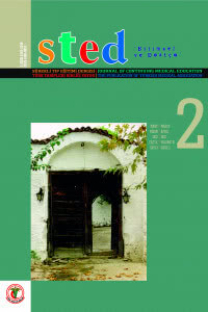Üniversite Öğrencilerinin Kadına İlişkin Namus Anlayışı Tutumları
The Attitudes of the University Students towards Perception of Honor Attributed to Women
___
- Çarkoğlu A, Kalaycıoğlu E. Türkiye’de aile, iş ve toplumsal cinsiyet. 2013. Erişim Tarihi: 30.8.2017, Erişim Adresi: http://kasaum.ankara. edu.tr/files/2013/11/turkiyedeaileisvetoplumsalcins iyetraporu2.pdf.
- Turğut M, Feyzioğlu S. Türkiye Aile Yapısı Araştırması. 1. Basım. İstanbul: Araştırma ve Sosyal Politika Serisi 07; 2014. p.280-319.
- Türkiye Nüfus ve Sağlık Araştırması 2013 (TNSA 2013). Ankara: Hacettepe Üniversitesi Nüfus Etütleri Enstitüsü; 2014. p.59-73.
- Pınar G, Taşkın L, Eroğlu K. Başkent üniversitesi öğrenci yurdunda kalan gençlerin toplumsal cinsiyet rol kalıplarına ilişkin tutumları. Hacettepe Üniversitesi Hemşirelik Yüksekokulu Dergisi 2008; 47-57.
- Zeyneloğlu S, Kısa S, Yılmaz D. Turkish nursing students’ knowledge and perceptions regarding virginity. Nurse Education Today 2013; 33:110-15.
- Gümüşoğlu F. Ders kitaplarında toplumsal cinsiyet. Toplum ve Demokrasi 2008; 2(4):39-50.
- Çelik C. Değişim sürecinde Türk aile yapısı ve din pragmatik anlam ve işlev farklılaşması. Karadeniz 2009; 25-35.
- Uçar T, Derya YA, Karaaslan T, Tunç ÖA. Üniversite Öğrencilerinin Toplumsal Cinsiyet Rollerine İlişkin Tutumları ve Şiddet Davranışları. Sürekli Tıp Eğitimi Dergisi 2017; 26(3):96-103.
- Sis Çelik A, Pasinlioğlu T, Tan G, Koyuncu H. Üniversite öğrencilerinin cinsiyet eşitliği tutumlarının belirlenmesi. Florence Nightingale Hemşirelik Dergisi 2013;21(3):181-86
- Kodan-Çetinkaya S. Üniversite öğrencilerinin şiddet eğilimlerinin ve toplumsal cinsiyet rollerine ilişkin tutumlarının incelenmesi. Nesne 2013;1(2):21-43.
- Vefikuluçay D, Zeyneloğlu S, Eroğlu K, Taşkın L. Kafkas üniversitesi son sınıf öğrencilerinin toplumsal cinsiyet rollerine ilişkin bakış açıları. Hacettepe Üniversitesi Hemşirelik Yüksekokulu Dergisi 2007; 26-38.
- Bilgili N, Vural G. (2011). Kadına yönelik şiddetin en ağır biçimi:namus cinayetleri . anadolu Hemşirelik ve Sağlık Bilimleri Dergisi 2011;14(1): 66-7
- Yılmaz DV, Zeyneloğlu S, Kocaöz S, Kısa Z, Taşkın L, Eroğlu K. Üniversite öğrencilerinin toplumsal cinsiyet rollerine ilişkin görüşleri. Uluslararası İnsan bilimleri Dergisi 2009;6(1): 775-92.
- Kömürcü N, Yıldız H, Toker E, Karaman ÖE, Koyucu RG, Durmaz A, ve ark. Hemşirelik ve ebelik öğrencilerinin toplumsal cinsiyet rolleri ve kadına ilişkin namus anlayışları ile ilgili tutumları. Uluslararası Hakemli Kadın Hastalıkları ve Anne Çocuk Sağlığı Dergisi 2016;5(3):1-22.
- Yazıcı T, Topalak Şİ. Mesleki Türk müziği ve batı müziği eğitimi almakta olan üniversite öğrencilerinin namusa ilişkin tutumları. Eğitim ve Öğretim Araştırmaları Dergisi 2014;3(2):275-85
- Işık R, Sakallı-Uğurlu N. (2009). Namusa ve namus adına kadına uygulanan şiddete ilişkin tutumlar ölçeklerinin öğrenci örneklemiyle geliştirilmesi. Türk Psikoloji Yazıları 2009;12:16-24.
- Coşansu G. Veri analizi ve yorumlama. İçinde: Erdoğan Ş, Nahcivan N, Esin MN, editörler. Hemşirelikte Araştırma. 2. Baskı. İstanbul: Nobel Tıp Kitabevleri; 2015. p.235-79
- Gürsoy E, Özkan HA. Türkiye’de üniversite öğrencilerinin kadına ilişkin “namus” algısı. Psikiyatri Hemşireliği 2014;5(3):149-59.
- Sakallı-Uğurlu N, Akbaş G. Namus kültürlerinde “namus” ve “namus adına kadına şiddet”: Sosyal psikolojik açıklamalar. Türk Psikoloji Yazıları 2013;16(32):92-4.
- İnci ÜH. Basında yer alan namus cinayetlerinin sosyolojik analizi. Tarih Kültür ve Sanat Araştırmaları Dergisi 2013;2(3):282-96.
- T.C. Millî Eğitim Bakanlığı, Eğitimi Araştırma ve Geliştirme Dairesi Başkanlığı. Medyada töre ve namus cinayetlerinin yansımaları, veliler ve öğrenciler üzerindeki etkileri. 2008. Erişim Tarihi: 30.8.2017. Erişim Adresi: http://www.meb.gov.tr/earged/earged/tore_namu s_etkileri.pdf
- Türk Dil Kurumu (TDK). Güncel Türkçe sözlük. Erişim Tarihi: 30.8.2017. Erişim Adresi: http://www.tdk.gov.tr/index.php?option=com_gts &arama=gts&guid=TDK.GTS.59d236590ffb64.29 861985
- Gürsoy E, Arslan H. (2011). Üniversite öğrencilerinde kadına ilişkin “namus” anlayışı tutum ölçeği (KINATÖ) geçerlilik ve güvenilirlik çalışması. Sağlık ve Toplum Dergisi 2011;21(3):28-37.
- Yağbasan M, Kolyiğit H. Üniversite öğrencilerinin namus töre ve şiddet algısı (Fırat Üniversitesi özelinde bir alan araştırması). Akademik Sosyal Araştırmalar Dergisi 2016;4(35):1-18.
- World Economic Forum. The global gender gap report 2016. Erişim Tarihi: 30.8.2017. Erişim Adresi: http://reports.weforum.org/global-gendergap- report-2016/rankings/
- World Health Organisation (WHO). Gender, equity and human rights 2017. Erişim Tarihi: 30.8.2017, Erişim Adresi: http://www.who.int/gender-equityrights/ understanding/gender-definition/en/
- Kalav A. Namus ve toplumsal cinsiyet. Mediterranean Journal of Humanities 2012;II/2:151-63.
- ISSN: 1300-0853
- Yayın Aralığı: 6
- Başlangıç: 1992
- Yayıncı: -
Sigara Bırakma Hizmeti Sunumunda Halk Sağlıkçının Rolü Kursu ve Katılımcı Görüşleri
Seyfi Durmaz, SÜLEYMAN AYHAN ÇALIŞKAN, IŞIL ERGİN, HÜR HASSOY, GÖRKEM YARARBAŞ, İSABEL RAİKA DURUSOY ONMUŞ
Cerrahi Hemşirelerde Merhamet ve Kültürlerarası Duyarlılığı Etkileyen Faktörler
Şenay KARADAĞ ARLI, AYŞE BERİVAN BAKAN
Cerrahi Menopozun Cinsel Yaşam Üzerine Etkileri
Meltem Mecdi KAYDIRAK, Ümran YEŞİLTEPE OSKAY
Üniversite Öğrencilerinin Kadına İlişkin Namus Anlayışı Tutumları
Özlem ÇİÇEK, SEVCAN FATA, Müge ŞERBET, Ezel DENİZ
Berrak Mızrak ŞAHİN, NEBAHAT ÖZERDOĞAN
Hemşirelik Öğrencilerinin Profesyonel Tutumları ve Etkileyen Faktörler
BEDRİYE AK, BİRGÜL CERİT, Yurdanur DİKMEN, Funda EROL
Okullarda Sağlığın Geliştirilmesi Uygulamalarında Medya Okur Yazarlığı Yaklaşımının Kullanılması
